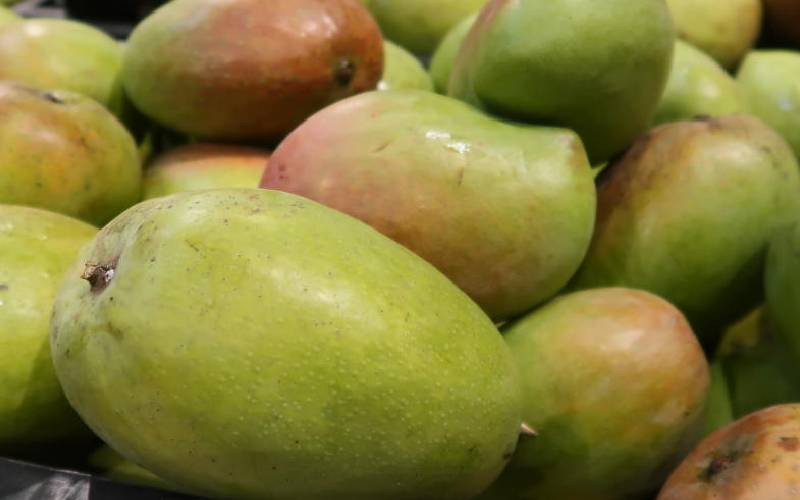
Small-holder mango farmers in Tana River will soon smile all the way to the bank after the government announced plans to expand the fruit processing plant in the county.
Currently, the Coast Development Authority’s (CDA) integrated fruit processing plant in Hola, Galole constituency has the capacity to process 1,000 litres of mango pulp per hour.
The National Assembly Committee on Regional Development led by Majimbo Kalasinga at the weekend said they will support the expansion of the factory to enable it to process at least 3,000 litres of mango pulp per hour.
“This translates to almost double the current capacity of processing 1,200 tonnes of mangoes per year. The livelihoods of farmers in this region will significantly increase,” said Mr Kalasinga, who is Kabuchai MP.
The committee that completed a two-day of the region on Saturday, was optimistic that post-harvest losses will be a thing of the past once the factory is expanded.
Expansion of the Sh245 million plant was officially commissioned in November 2023 by President William Ruto after five years of delays due to financial constraints after its inception in 2017.
At inception, the plant operated manually but the government has since expanded it by installing a pulp processing plant, auxiliary facilities and a waste management system.
Tana River is one of the major mango-producing counties in Kenya.
More than 30,000 households depend on mango farming in the area and harvest more than 50,000 tonnes every season.
The farmers transport more than 35,000 tonnes to markets and industries in Mombasa, Garissa and Nairobi.
“Unfortunately, a substantial portion of this precious produce remains unsold in local markets or left to rot on farms due to lack of buyers. The same has also been noticed in other counties in the Coast region,” East Africa Community, Arid and Semi-Arid Lands and Regional Development Cabinet Secretary Peninah Malonza said in November last year during the commissioning of the plant.
The mango season in Tana River runs from October to March and as a result, a water bottling component with a capacity to process 1,000 litres per hour of purified water was introduced to complement pulp processing and ensure sustainability.
Kalasinga assured that the government is keen to enhance value addition and increase farmers’ earnings in the country.
The plant, he said, needs to be expanded to increase the capacity of the machine to satisfy the market.
“As a committee, we should see what best we can do for this plant to move from 1,000 litres per hour to 3,000 litres per hour to absorb more mangoes from the market,” Kalasinga said.
He urged CDA to offer farmers competitive prices to save them from exploitation by brokers.
Kalasinga was accompanied by committee members Mwago Amos (Starehe), Mwalimu Kombe (Magarini), Peter Nabulindo (Matungu), Paul Abour (Rongo) and Major (Rtd) Dekow Barrow (Garissa).
Kombe urged farmers to supply more mangoes to the plant to ensure continuous pulp production.
“Unfortunately, some farmers harvest immature mangos thus contributing to losses. I advise farmers to put more effort by increasing farm acreage under mangoes and to be careful during harvesting to avoid losses,” he said.
He said the plant, if well utilized will significantly improve the economy of the Coast region.
CDA Managing Director Mohamed Keynan said the factory was established to cushion mango farmers in Tana River, Garissa, Lamu and Kilifi counties from post-harvest losses.
“We installed a one-tonne-per-hour capacity crushing machine which produces pulp. The pulp is the puree that will sell to juice makers,” Keynan said.
“Because mango production is seasonal, there are certain months that we are not in production, in that case, as an institution we were able to install a water processing line,” he added.
Galole Mango Farmers’ Cooperative Society vice-chair Deye Salim said CDA offers competitive prices which has attracted more farmers.
“We have seen the direct impact of the plant. However, there are still some gaps that must be addressed to move in the right direction. In the past, mangoes used to mature well but brokers made farmers harvest immature mangoes,” Salim said.
However, today, farmers are more enlightened because of public engagement by the CDA.
Jamey Ayu, a mango farmer, has seen first-hand the economic impact of mangoes. “I have educated my children up to the university level. We want the plant to be expanded to process more mangoes and create employment to improve our livelihoods,” she said.




